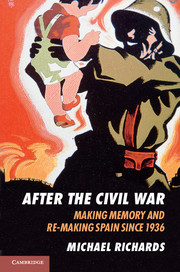Book contents
- Frontmatter
- Contents
- List of maps and tables
- Preface
- Acknowledgements
- Maps
- Introduction: cultural trauma in Spain
- Part I Setting the scene
- Part II Memories of war during the Franco years
- 3 Repression and remembrance: the victors’ liturgy of memory
- 4 Repression and reproduction: social memory in the 1940s
- 5 Memory and politics: from civil war to Cold War
- 6 Memory and migration: flight from the countryside in the 1950s
- 7 Commemorating ‘Franco's peace’: the 25th anniversary of the Victory
- 8 Contesting ‘Franco's peace’: transformation from below in the 1960s
- 9 Transition and reconciliation: politics and the Church in the 1970s
- Part III Memories of war after Franco
- Conclusion: the history of war memories in Spain
- Glossary and abbreviations
- Sources and select bibliography
- Index
- References
6 - Memory and migration: flight from the countryside in the 1950s
Published online by Cambridge University Press: 05 June 2013
- Frontmatter
- Contents
- List of maps and tables
- Preface
- Acknowledgements
- Maps
- Introduction: cultural trauma in Spain
- Part I Setting the scene
- Part II Memories of war during the Franco years
- 3 Repression and remembrance: the victors’ liturgy of memory
- 4 Repression and reproduction: social memory in the 1940s
- 5 Memory and politics: from civil war to Cold War
- 6 Memory and migration: flight from the countryside in the 1950s
- 7 Commemorating ‘Franco's peace’: the 25th anniversary of the Victory
- 8 Contesting ‘Franco's peace’: transformation from below in the 1960s
- 9 Transition and reconciliation: politics and the Church in the 1970s
- Part III Memories of war after Franco
- Conclusion: the history of war memories in Spain
- Glossary and abbreviations
- Sources and select bibliography
- Index
- References
Summary
What customs! Such a different way of life! In the countryside we live always dependent on the harvest, forever looking to the heavens and calling on Divine Providence. I've always believed in God, but since I arrived in Madrid, I've felt so bewildered that I no longer know what to think.
The displacement of war memories
We can refer to the displacement of memories in the first twenty years or so of the post-war era in two principal ways. First, it is necessary to discuss the violent uprooting of the rural poor which was engendered by the conflict and its repressive aftermath. Although migrants were reluctant to give details and often wished not to talk about their towns or villages of origin, oblique references to ‘denunciation’, ‘shaming’, loss of ‘honour’, ‘falling into disgrace’, and the often unbearable ‘harsh criticisms’ or ‘sanctions’ of neighbours, which made ‘remembering past events upsetting’, would all seem to confirm that fleeing from rural pueblos, as one confided, ‘separated them from a sorrowful past’. The most economically humble classes of the Spanish countryside were far from being the only section of society to suffer the consequences of the war, but they bore the brunt collectively more than most other social groups. At the sharp end of state repression, the masses in rural poverty who possessed little or no social or cultural capital would become central actors, though silently, of the historical social change which was to follow. Migration led them to the margins of urban life, often to subhuman conditions, an existence determined by little else than material survival: ‘poverty diminished their faculties, reduced their horizons, and erased their initiatives. Many, since childhood, have developed in an atmosphere of hatred [and], despair [. . .] deceived by those who treated them badly in their place of origin and compelled them to leave.’ After the pervasive stasis of the 1940s it begins to become clearer when we look at the succeeding decade that the civil war had represented a social watershed as well as marking a deep political fracture. For the landless poor who had been amongst the most solid supports of the Republic, the war had destroyed the revolutionary myths of the 1930s, a blow which would provide the impulse for a flight from the countryside.
- Type
- Chapter
- Information
- After the Civil WarMaking Memory and Re-Making Spain since 1936, pp. 156 - 186Publisher: Cambridge University PressPrint publication year: 2013

